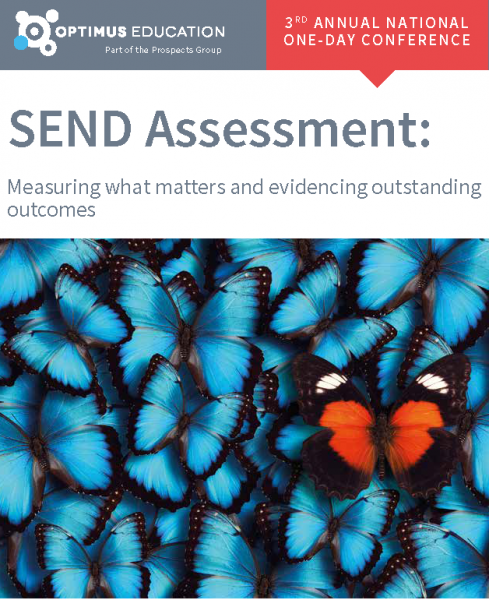As a member of the Rochford Review group, Richard Aird OBE explains why a much-needed change to statutory assessment is the focus of the review's interim report.

This is the first post in a three-part series on what the Rochford Review recommendations mean for schools. Follow the links below to read more from Richard.
You can also read the DfE's response to the consultation on the Rochford Review recommendations for information about the next steps.
The final report of the Rochford Review proposed change in the statutory assessment of pupils working below the standard of national curriculum tests at Key Stages 1 and 2, in particular pupils with SEND.
However, the recommendations are not just about proposing changes in methodology; they are as much about changing the culture of assessment.
The Commission for Assessment without Levels (CAWL) reported in 2015 that the practice of statutory assessing pupils by reference to the levels of the old national curriculum had prompted schools to focus too much on pushing pupils through these levels.
Rather than ensuring pupils were secure in their understanding of the core concepts, skills and problem-solving abilities, schools were accused of having reduced their curriculum content to include only what was required in order to secure a best fit level award.
Although levels were withdrawn from the new national curriculum and the content of end of key stage statutory assessment, the P Scale levels of the old national curriculum remained in force for pupils with SEND and those working below the standard of the newly introduced end of key stage tests.
The P levels were first developed to assist pupils with SEND access the national curriculum following its introduction as part of the Education Reform Act (1988).
The starting point of the national curriculum had been pitched at too academic a level for many low attaining pupils, and the backlash prompted the development of a hierarchy of 8 P levels per subject of the national curriculum.
In due course, pupil assessment by reference to the P levels became a statutory requirement and the government also commissioned a short series of Progression Guidance publications in an effort to define the rate by which pupils with SEND were expected to make progress through the P level hierarchy.
As a consequence, many schools purchased commercial software to assist them record and report pupil progression data which, according to the CAWL report, was probably more about satisfying what schools thought Ofsted inspectors wanted to see, rather than what parents and carers wanted to read about how well their children were overcoming the barriers posed by their SEND and disabilities.
The curriculum on offer in many special schools at the time reflected the incremental trend towards inclusive education, with schools adapting Programmes of Study to form the bulk of the curriculum they had on offer.
Immediately prior to this trend, specialist initial teacher training in SEN had been phased out, leaving teachers have only had experience of teaching pupils with SEN by reference to the national curriculum and its linear P level system of statutory assessment.
A culture in special education was allowed to flourish in which the dogma of inclusive education dominated the provision of curriculum, pedagogy and statutory assessment.
In 2013 new legislation was enacted in an effort to improve outcomes for children and young people with SEND: ‘The Children and Families Act’ (2013) and ‘SEND Code of Practice’ (2013).
However, the focus in some schools has remained largely on delivering the national curriculum with its accompanying emphasis on P level progression, rather than developing the kind of specialist provision which the new legislation requires, for example in response to the demands of Education, Health and Care (EHC) plans.
The new legislation’s perceived lack of impact influenced the commissioning of the Rochford Review and its terms of reference, which included the need to consider how changes in statutory assessment might support the ambitions of the new legislation.
In order to support such ambitions, the Rochford Review soon realised that a change in the actual culture underpinning statutory assessment would be necessary.
Optimus members can read our full Q&A with Richard on the journey to the final report and its implications for schools.
The CAWL report was concerned that the inclusive approach to statutory assessment was not immediately helpful for improving provision and outcomes for pupils with SEND.
It welcomed the commissioning of a more in-depth review of the P levels by the Standards and Testing Agency (STA) which later became known as the Rochford Review (2016).
The review was commissioned initially for just a series of six full-day meetings, to examine the statutory assessment of pupils working below the standard of tests in the new national curriculum. It soon became apparent that at least twice this number of meetings would be required.
The Rochford Review first considered the circumstances of pupils working at P5-8, and those described as falling into the ‘gap’ between P8 and level 1 of the old national curriculum.
Much of the time available was taken up working with curriculum experts to extend the standards of the new national curriculum at Key Stages 1 and 2 in order to provide pre-key stage standards and ensure that as many pupils as possible would be able to participate in statutory testing arrangements.
P5 was selected as the cut off point for statutory testing because the learning matter was considered as representing the first stages of learning which could be reliably defined as ‘subject specific’.
During this first cycle of meetings, learning matter at P4 and below was regarded as representing the earliest stages in child development which are prerequisite to the acquisition of knowledge classified under subject headings.
This classification of learning was not dissimilar to that used in the P levels, where learning criteria at P1-3 have always been generic across all subjects.
Although the Rochford Review supported the notion of statutory testing for pupils at P5 and above, it stressed that entering pupils to statutory tests should only be at a time when individual pupils were judged to be ready academically and emotionally.
This caution was partially to ensure that pupils are first able to demonstrate mastery in all aspects of the Programmes of Study for a key stage before being entered for tests.
The caution was also partially in recognition that the formal testing of pupils disadvantaged by deprivation or having English as an Additional Language (EAL) is probably not the best way of assessing their actual standards of learning.
The review recommended that testing should only be done when pupils are ready to be tested and in ways that respect their idiosyncratic circumstances, adding that a much more in depth review was required on behalf pupils with EAL and those suffering disadvantage.
The interim report was published early in 2016, which included the recommendation for pupils at P5 and above to be statutory assessed by reference to the pre-key stage standards developed in collusion with curriculum experts.
Further work, we realised, was necessary before the report could comment objectively on the future of the P levels and what changes in the statutory assessment of the lowest attaining pupils might be recommended.
This is the first post in a three-part series on what the Rochford Review recommendations mean for schools. Follow the links below to read more from Richard.
 What's the next step?
What's the next step?Our forthcoming 'SEND Assessment to Support Progress' conference is the only event that will give you the knowledge and strategies needed to accurately assess the progress of SEND pupils in your school, and evidence this to parents and Ofsted.
For more information and to secure your place, find out more about this crucial event.